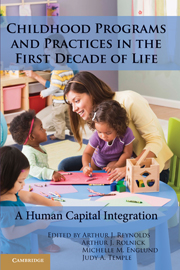Book contents
- Frontmatter
- Contents
- Contributors
- Foreword: The Essential Role of Youth Development by Robert H. Bruininks
- Acknowledgments
- 1 Early Childhood Development and Human Capital
- PART I PRENATAL AND INFANT PROGRAMS
- PART II PRESCHOOL EDUCATION
- 6 Project Head Start: Quality and Links to Child Outcomes
- 7 The Challenge of the HighScope Perry Preschool Study
- 8 Impacts and Implications of the Child-Parent Center Preschool Program
- 9 Small Miracles in Tulsa: The Effects of Universal Pre-K on Cognitive Development
- 10 Lessons From the Evaluation of the Great Start Readiness Program (GSRP): A Longitudinal Evaluation
- 11 Abbott Preschool Program Longitudinal Effects Study Year One Findings
- Commentary: Are We Promising Too Much for Preschool Education Programs?
- PART III KINDERGARTEN AND EARLY SCHOOL-AGE SERVICES AND PRACTICES
- PART IV ECONOMIC SYNTHESES OF EARLY CHILDHOOD INVESTMENTS
- Appendix Question-and-Answer Sessions
- Name Index
- Subject Index
- References
7 - The Challenge of the HighScope Perry Preschool Study
Published online by Cambridge University Press: 05 June 2012
- Frontmatter
- Contents
- Contributors
- Foreword: The Essential Role of Youth Development by Robert H. Bruininks
- Acknowledgments
- 1 Early Childhood Development and Human Capital
- PART I PRENATAL AND INFANT PROGRAMS
- PART II PRESCHOOL EDUCATION
- 6 Project Head Start: Quality and Links to Child Outcomes
- 7 The Challenge of the HighScope Perry Preschool Study
- 8 Impacts and Implications of the Child-Parent Center Preschool Program
- 9 Small Miracles in Tulsa: The Effects of Universal Pre-K on Cognitive Development
- 10 Lessons From the Evaluation of the Great Start Readiness Program (GSRP): A Longitudinal Evaluation
- 11 Abbott Preschool Program Longitudinal Effects Study Year One Findings
- Commentary: Are We Promising Too Much for Preschool Education Programs?
- PART III KINDERGARTEN AND EARLY SCHOOL-AGE SERVICES AND PRACTICES
- PART IV ECONOMIC SYNTHESES OF EARLY CHILDHOOD INVESTMENTS
- Appendix Question-and-Answer Sessions
- Name Index
- Subject Index
- References
Summary
HIGHSCOPE PERRY PRESCHOOL STUDY METHODOLOGY
The HighScope Perry Preschool Study is a scientific experiment that has identified the short- and long-term effects of a high-quality preschool education program for young children living in poverty (Schweinhart et al., 2005). From 1962 through 1967, David Weikart and his colleagues in the Ypsilanti, Michigan, school district operated the preschool program for young children to help them avoid school failure and related problems. They identified a sample of 123 African American children living in poverty who were assessed to be at high risk of school failure. They randomly assigned 58 of them to a group that received a high-quality preschool program at ages 3 and 4 and 65 to a group that received no preschool program. Because of the random-assignment strategy, children's preschool experience is the best explanation for subsequent group differences in their performance over the years. Project staff collected data annually on both groups from ages 3 through 11 and again at ages 14, 15, 19, 27, and 40, with a missing data rate of only 6% across all measures.
This study has followed the lives of 123 persons who originally lived in the attendance area of the Ypsilanti school district's Perry Elementary School, a predominantly African American neighborhood in a low-income part of town. Project staff identified a pool of children for the study sample from a census of the families of students then attending the school, referrals from neighborhood groups, and door-to-door canvassing.
Information
- Type
- Chapter
- Information
- Childhood Programs and Practices in the First Decade of LifeA Human Capital Integration, pp. 157 - 167Publisher: Cambridge University PressPrint publication year: 2010
References
Accessibility standard: Unknown
Why this information is here
This section outlines the accessibility features of this content - including support for screen readers, full keyboard navigation and high-contrast display options. This may not be relevant for you.Accessibility Information
- 5
- Cited by
